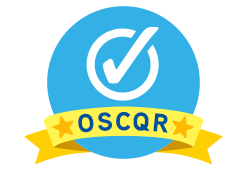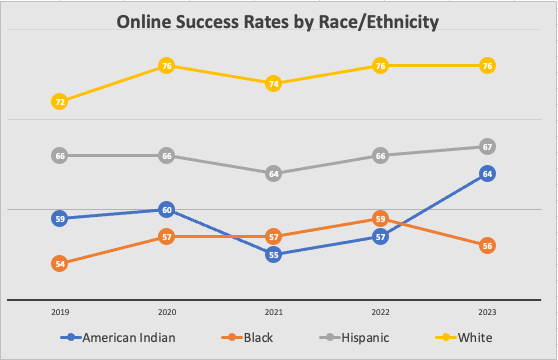Online Design Standards & Quality Review
Purpose of a Quality Review Rubric
Since the beginning of online education, student success rates have been a topic of concern. Many colleges and universities have addressed this issue by adopting quality review rubrics which provide a set of standards for evaluating and improving the quality of online courses. The aim is to support student success by providing guidelines and criteria for designing, developing, and delivering effective online learning experiences.
Open SUNY Course Quality Review (OSCQR)

Recently, MCC migrated to an Open rubric known as the Open SUNY Course Quality Review (OSCQR). This tool reflects MCC’s value in adopting Open Content because it is Open and Creative Commons licensed. It includes widely researched and adopted standards for online learning. It is easy to access and can be filled out and shared in Google Drive! Learn more about the rubric here.
What Happened to Quality Matters (QM)?
Many of you might be familiar with Quality Matters (QM), one of the first quality review rubrics. Mesa adopted the QM rubric and process in 2007. Although it is a great rubric, it is a proprietary tool which focuses on a strict review process that MCC has neither fully adopted nor embraced. Currently the District still provides access to this rubric, however, we believe you will find the OSCQR rubric superior.
OSCQR Rubric Format
The OSCQR rubric consists of a comprehensive set of criteria that cover various aspects of course design and delivery. Additionally, it has exceptional functionality within your Google Drive. The rubric can display as a Google Sheet in which each standard provides a link to detailed explanations with specific text and visual examples. Additionally, if you choose to conduct a self review, an action plan is automatically created from the notes you take including time estimations for completing tasks.
OSCQR Rubric Standards
OSCQR rubric standards and criteria are generally described below:
- Course Overview and Information: This section focuses on providing clear course goals, objectives, and instructions for students, as well as establishing a positive and welcoming tone.
- Course Technology and Tools: This section focuses on the integration of appropriate technology tools and media to enhance the learning experience and support diverse learning styles.
- Course Design and Layout: This section is all about the layout of the course and accessibility and readability of content ensuring that all learners can access course content.
- Course Content and Activities: This category addresses the quality, relevance, and accessibility of instructional materials, including multimedia elements and external resources.
- Interaction: The rubric highlights the need for engaging and interactive learning activities that promote student engagement, collaboration, and critical thinking.
- Assessment and Feedback: Here, the rubric emphasizes the importance of well-defined and measurable learning objectives, along with aligned assessments that effectively measure student mastery of the objectives. Additionally, this category addresses gathering student feedback and using it to improve the course, as well as assessing the effectiveness of teaching strategies.
Review these standards and criteria fully at the OSCQR website.
Equity Issues – Peralta Online Equity Rubric
We would be remiss to not mention the significant equity gaps in our online retention and success. The image to the left shows the MCC 5 year success rate trend by race/ethnicity for online classes. Given this data, we must address equity issues in our online classes. We are failing or withdrawing students who identify as Black, American Indian, or Hispanic between 10%-20% more than their White classmates. Because the OSCQR rubric is Open, we are able to modify it to meet our significant equity needs and have included six standards from the Peralta Online Equity Rubric (Peralta Standards 3-8).
Interested in Improving Your Online Class?
There are a couple ways to improve your online class and help move the needle for our online course success rates.
- Z Degree Expert Model Program: The Expert Model is a collaborative process that partners discipline expert faculty with an instructional designer to develop a zero-textbook-cost course template which can be shared. This process focuses on developing a fully aligned course map in which the instructional designer then builds inside Canvas. Click here to learn more
- Summer Z Academy Program: The Summer Z Academy is held during the first week of June. It is an in-person professional development experience that spans three days for 5 hours each. The sessions are followd up with additional online workshops totaling 2-4 hours. After the in-person and online learning, the faculty will develop their Z Degree course in the Z Course Template. The MCC Online department will provide feedback and guidance on the completed course. Accepting applications in March 2024
- Apply for a Z Course Process: This process allows faculty who already teach with or who have identified zero-textbook-cost course materials to edit their course for Z Course tag approval. Click here to learn more
- OSCQR Rubric Self Study & Review: Review the OSCQR rubric and examples independently and do your own self review from this Z Academy OSCQR rubric copy template.


